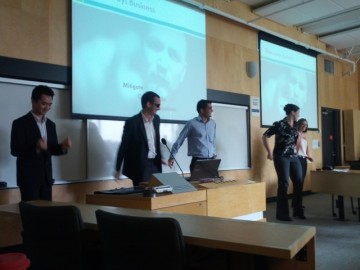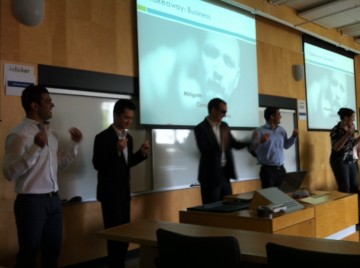Mitigate. Compensate. Negotiate. Rob Kasp Sawan was the inspiration for one of the MBA teams to complete their report on their aboriginal leader interview with a rap folding in the concepts of mitigate, compensate, negotiate. KASP stands for Keeping Allive Stories for People. http://www.kaspentertainment.com/KASP_Biography.pdf
The inaugural run of the Business in Society module focusing on indigenous leadership & the culture of engagement wound up yesterday with presentations from 12 teams of students who after a couple of days of intensive immersion with the likes of Judith Sayers, Kim Baird and Geoff Plant ventured out to interview 12 leaders in our community. Here is the schedule for the week: 25May13 MBA Business in Society May AGENDA FINAL
A huge thanks to: Rod Hill, BC Hydro; Leslie Bonshor, FN Health at the Fraser Health Authority; Dave Eddy, Vancouver Native Housing Society; Norm Leech, FN Technology Council; MIke Bonshor, MBP Consulting; Phillip Lee, Aboriginal Affairs & Northern Development Canada; Doris Bear, RBC Royal Bank; Shain Jackson, Spirit Works; Colette Anderson, Aboriginal Affairs & Northern Development Canada; Rick Colbourne, Ch’nook; David Mannix, Coast Opportunities; and, Debra Martel, FN House of Learning at UBC.
The teams had just over 24 hours to prepare for and conduct the interview and then create a presentation with their findings. I only saw six of the presentations — they were outstanding, each in their own way.
These photos show Team 1 who learned about BC Hydro’s award-winning relationships with First Nations and their process around the steps of mitigation, compensation and negotiation.
Other teams took different approaches. Team 11 decided to mine the experiences of their members — both international and local. They began their presentation with stories about their own countries. The parallel experiences of indigenous peoples in Korea and India were particularly compelling.
For me, it was an emotional day. Not just because of the content. But because I believe that this type of “learning by doing and experiencing” is about as good as it gets. And we just don’t have enough of this in business school education. So it was a great beginning.

